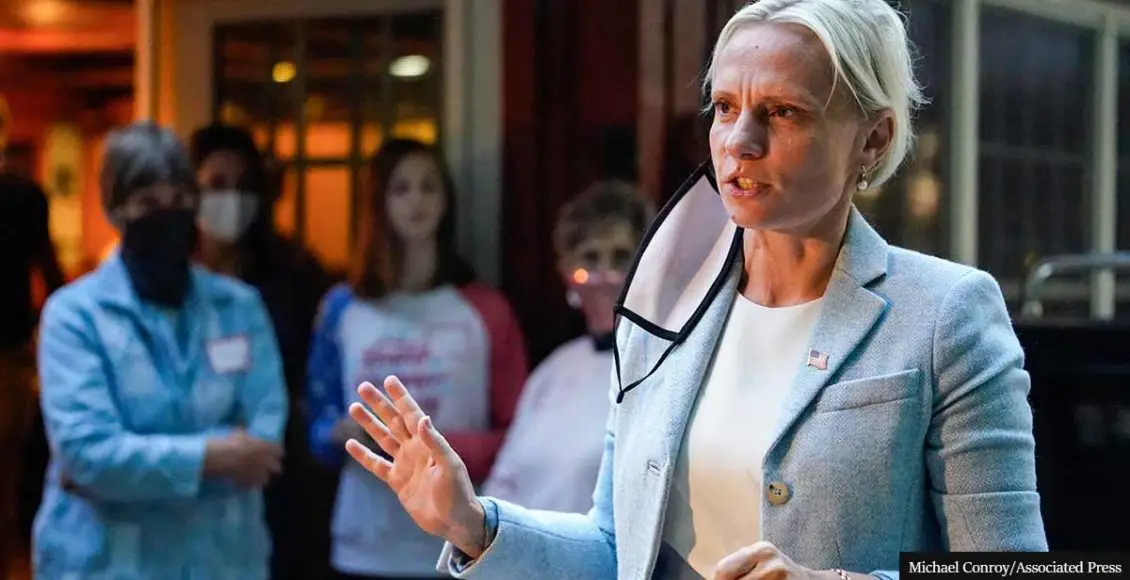Congresswoman who grew up in a socialist country says Biden’s policies UNDERLINE the socialist system

Ukraine-born Indiana Rep. Victoria Spartz claims President Biden’s policies have “underlined” those of the socialist system.
- Indiana Rep. Victoria Spartz claimed Biden’s policies “underline” the socialist system.
- The Ukraina-born congresswoman highlighted the current “accumulation of centralized power” in the U.S. as a similarity to the way the Soviet Union was governed.
- Spartz immigrated from Ukraine to America in 2000 and is now one of the first Republican female immigrants in the U.S. House of Representatives.

Indiana Rep. Victoria Spartz, one of the first Republican female immigrants in the U.S. House of Representatives, associated President Joe Biden’s policies with socialism, as The Daily Wire notes.
In an interview with CNS News, the Ukraine-born representative was asked:
“Do you think President Joe Biden, in his policies, is a socialist? Or how would you describe his policies?”
In a detailed response, Spartz confirmed she believes Biden’s approaches are similar to those of politicians in the socialism system. To begin with, she remarked “there are two economic systems,” adding:
“One system where the decision is done by stakeholders in the market, by private enterprise, free enterprise system. We exchange transaction, and we decide, right, what you’re going to buy, and you decide what you’re going to pay and we come to an agreement. We have this arms-length transaction.
Another system where decisions are more centralized and made by the government. You know, that is what socialist system is about.”
The Indiana Rep. highlights the “accumulation of centralized power” as a significant similarity between socialism and Biden’s policies.
Spartz continued:
“Government…intervenes in making a lot of decision and providing, you know, really, you know, the centralized, you know, power, accumulation of centralized power.
So if you look about that, you know, I mean, great example, you know, all of the price controls, wage controls — when the government decide what is gonna be paid in the market, when the government decide what prices are going to be, when the government start controlling assets and talking about public option insurance company, government owns assets.
Actually, by pure definition of socialism by Karl Marx, when governments start owning assets and owning companies it is the definition of socialism. When government make this decision for you instead of you, you know, that is actually the definition of socialism.”

To make her point clear, she added:
“So a lot of his policy have underlined, you know, the policy of socialist system. You know, so I think it’s unfortunate that the system that failed in a lot of countries — it took Soviet Union 70 years to fail — you know, now is being promoted in our country because its centralized government and decision making never works out.
You know, I think Margret Thatcher said until you run out of money it works, right? Because you do. And you see what’s happening in countries like Venezuela, you know, you can see what’s happening in countries like Cuba, you know.
These are countries — they have resources, you know, they have good people out there, the system is just rotten from inside, and it’s unfortunate that we promote some of them.”
The Ukrainian-American politician was born in Ukraine in 1978 and immigrated to the U.S. in 2000.
She became a legal U.S. citizen in 2006. Her home country was part of the Communist Soviet Union from 1922 to 1991, meaning Spartz lived under socialist rules for the first 13 years of her life.

When the reporter asked her about her background under a Communist system, she explained:
“Life in a socialist country is not very easy. You know, it’s — when people talk about equality, it’s really equality in misery where you have a political elite and classes on top and then everyone else is trying to be suppressed to be equally poor.
Unfortunately, even a system like that — even a country like the Soviet Union had a lot of resources — don’t really, you know, don’t stay like that forever and run out of money because the system is very inefficient and people don’t like to be suppressed, you know, you can do it for so long. And it’s really no freedoms, governments tell you what to do and if you don’t listen to the government, you can be in jail.”
Spartz added:
“You know, I had to, my grandma was very religious; she wanted me to be baptized, so I had to be baptized secretly. You have to pray secretly; you cannot have a religion.
You go to stores, you know, a lot of people don’t realize that coke, actually Pepsi, in the Soviet Union, and bananas were the luxury that you might have sometimes if you have good connections, and it is a very, very small selection of food.
You have to wait for years to get a cow, a lot of people never had a cow or had a refrigerator or TV, you might wait for years to get a TV. So it was a not very fun life, but also when system fails it becomes very destructive and difficult, too and create around — in post-Soviet times were very turbulent times. A lot of bandits and mafias controlling the country, so that was tough.”

